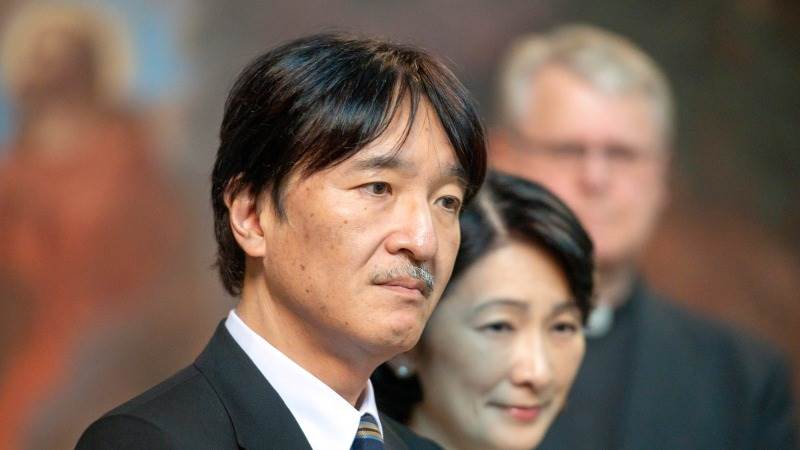
Crown Prince Fumihito (Prince Akishino): A Japan’s Imperial Throne
japanchildrenrights.org – Crown Prince Fumihito, also known as Prince Akishino, born on November 30, 1965, is the younger brother of Emperor Naruhito and the second in line to Japan’s Chrysanthemum Throne. As a member of the Japanese Imperial Family, Crown Prince Fumihito plays a significant role in the country’s royal lineage, balancing his traditional duties with the responsibilities of modern public life. His journey, from childhood to the heir apparent, reflects both the continuity and the changes within the monarchy as it adapts to Japan’s evolving society.
Crown Prince Fumihito’s life is defined by his educational pursuits, his role as a family man, and his dedication to his royal duties. As he prepares for a future that may one day see him take the throne, his influence on the Japanese monarchy continues to grow, especially amid ongoing debates about the future of the imperial succession.
Early Life and Education
Crown Prince Fumihito was born as the second son of Emperor Akihito and Empress Michiko. He grew up in the Imperial Household in Tokyo, experiencing a life marked by tradition, but also by the modern influences that shaped post-war Japan. Fumihito was raised with a sense of responsibility, knowing from a young age that his place in the royal family was integral to the future of Japan’s imperial lineage.
Fumihito was educated within Japan, first attending the prestigious Gakushuin Primary School, which has traditionally educated members of the royal family. His education was further extended at Gakushuin University, where he studied political science. However, it was during his time abroad, particularly at the University of Oxford in the United Kingdom, that he gained valuable insights into the world beyond Japan’s imperial traditions. Fumihito’s time in the West helped to broaden his worldview, and he was exposed to different academic disciplines and international perspectives, particularly those of history, culture, and diplomacy.
Crown Prince Fumihito’s interest in the natural sciences, particularly biology, became a defining feature of his academic career. He pursued a Ph.D. in agricultural science at the University of Tokyo, where he focused on the study of animal ecology. His work, particularly on the behavior of pheasants, became widely recognized. Fumihito’s academic pursuits have allowed him to distinguish himself from his peers in the imperial family, contributing to his reputation as an intellectual and modernizing influence.
Marrying Kiko Kawashima and Starting a Family
In 1990, Prince Akishino’s life took a significant turn when he married Kiko Kawashima, a commoner who had a background in psychology and was also a graduate of Gakushuin University. Kiko’s marriage to Prince Fumihito was groundbreaking in the sense that she was the first commoner to marry a member of the Imperial Family in nearly three decades, following the marriage of Empress Michiko and Emperor Akihito.
The couple’s union marked an important shift in the imperial family’s approach to marriage. Prince Fumihito and Princess Kiko’s relationship demonstrated the changing dynamics of the royal family, where personal compatibility and choice were increasingly valued over strictly adhering to traditional expectations of noble bloodlines.
Together, Crown Prince Fumihito and Princess Kiko have had three children: Princess Mako, Princess Kako, and Prince Hisahito. Their son, Prince Hisahito, is the only male heir born into the imperial family in several decades, which has brought attention to the ongoing discussions about gender and succession within Japan’s monarchy. His birth in 2006 was widely celebrated as it ensured the continuation of the male line of succession to the Chrysanthemum Throne.
Crown Prince Fumihito and Princess Kiko’s family life has been relatively private, though their children have occasionally appeared in the public eye. The couple has prioritized raising their children with a strong sense of duty, humility, and respect for Japan’s traditions. Their children, particularly Prince Hisahito, are seen as important figures in the future of the imperial family, and the family’s roles will continue to evolve as the next generation of royals grows up.
Duties as Crown Prince
As the younger brother of Emperor Naruhito, Crown Prince Fumihito has always played a supporting role within the imperial family. He has accompanied his brother on numerous state visits abroad and participated in various royal duties in Japan. His role as Crown Prince is largely ceremonial, but it is also a position of great responsibility.
Crown Prince Fumihito has also taken on many of the duties associated with the modernizing trends in Japan’s monarchy. He has served as the president of several charitable foundations and organizations focused on science, culture, and education. Through his work, he has shown a deep commitment to addressing social issues, particularly those related to health, education, and the environment.
In addition to his ceremonial and philanthropic roles, Crown Prince Fumihito has been actively involved in the preservation of Japan’s cultural heritage. He has worked with various organizations that focus on promoting Japanese art, traditions, and history, playing an important role in fostering national pride and cultural continuity.
One of the Crown Prince’s most important roles is that of a representative of the imperial family at national events, such as state funerals, memorials, and New Year ceremonies. Though he is not yet Emperor, Crown Prince Fumihito’s responsibilities have increased as the monarchy adapts to contemporary times, and as Emperor Naruhito focuses on the changing demands of Japan’s royal institution.
The Debate on Imperial Succession
In recent years, Crown Prince Fumihito has found himself at the center of national discussions about the future of the Japanese imperial family. Japan’s current imperial succession law allows only male heirs to inherit the throne, which has raised concerns given the limited number of male heirs in the royal family. The birth of Prince Hisahito in 2006 provided some relief to the monarchy, ensuring that the line of succession would continue. However, concerns about the lack of male heirs and debates over whether female succession should be allowed have remained prominent.
Crown Prince Fumihito has been an advocate for preserving the male line of succession, emphasizing the importance of maintaining the traditions of the monarchy. He has also expressed support for the imperial family’s modernization and the need to adapt to the challenges of the 21st century. However, like his brother Emperor Naruhito, Crown Prince Fumihito has demonstrated a nuanced understanding of the complexities surrounding imperial succession, and he has been involved in discussions about the future of Japan’s monarchy.
Crown Prince Fumihito’s Future and Legacy
As the next in line to the throne, Crown Prince Fumihito’s future role in the Japanese imperial family is of significant importance. He is expected to continue representing the monarchy at a national and international level, playing a key part in shaping the future of Japan’s royal institution. His intellectual pursuits, commitment to public service, and modern approach to the monarchy position him as a leader who will guide the imperial family through an era of change.
Crown Prince Fumihito’s life has already been marked by his deep dedication to his family, his academic achievements, and his sense of duty to Japan. His future as Emperor, should he ascend to the throne, will undoubtedly bring both continuity and innovation to Japan’s monarchy. His legacy will be shaped not only by his actions but also by the ways in which he adapts the imperial family’s role to the needs of a modern, democratic Japan.
As Crown Prince Fumihito looks toward his future responsibilities, he carries with him the weight of centuries of imperial tradition, while also navigating the shifting dynamics of a rapidly changing world. His journey as an heir to the Chrysanthemum Throne is one of deep significance, not just for Japan but for the broader context of royal families around the globe.

